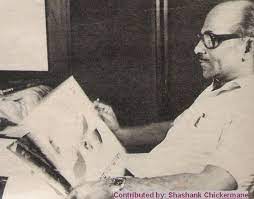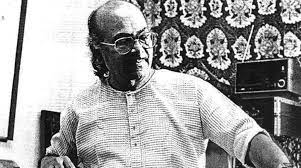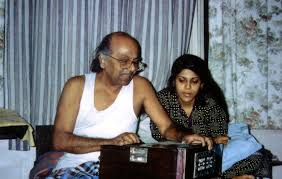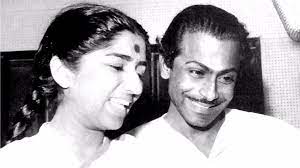Salil Chowdhury (1922–1995) was a renowned music director, composer, poet, writer and lyricist who left an indelible mark on the Indian music industry. He was born on November 19, 1922, in a small village in Bengal (now Bangladesh), Salil Chowdhury displayed a prodigious talent for music from a young age.

Picture: Social Media
He composed music for 13 languages films. These were 75 Hindi films, 41 Bengali films, 27 Malayalam films, and a few Marathi, Tamil, Telugu, Kannada, Gujarati, Odia and Assamese films. His musical ability was widely recognized and acknowledged in the film industry. He was an accomplished composer and arranger, adept at several musical instruments including flute, piano and esraj. He was also widely acclaimed for his inspirational and original poetry in Bengali.

Picture: Social Media
Salil Chowdhury’s early exposure to a musical environment can be attributed to his family background. His father, Gyanendra Chowdhury, was a renowned doctor, and his mother, Kusumkumari Devi, was a classical singer. This familial connection to the arts played a pivotal role in shaping Salil’s musical sensibilities.

Picture: Social Media
Salil Chowdhury received his formal education in music from the University of Calcutta. He was deeply influenced by the classical music traditions of India, especially Rabindra Sangeet. Additionally, he drew inspiration from Western classical music and was well-versed in various musical genres.
Salil Chowdhury entered the film industry in the late 1940s, and his career as a music director took off with the Bengali film “Paribartan” (1949). He soon gained recognition for his innovative and soul-stirring compositions. Salil’s ability to seamlessly blend Indian classical and folk elements with Western orchestration set him apart from his contemporaries.

Salil Chowdhury’s contribution to Indian cinema is immense, with a vast body of work spanning multiple languages. Some of his notable compositions include the timeless melodies of “Do Beegha Zameen” (1953), “Jagte Raho” (1956), “Madhumati” (1958), “Parakh” (1960), “Kabuliwala” (1961), “Maya” (1961), “Half Ticket” (1962) “Anand” (1971), “Mausam” (1975) and “Chhoti Si Baat” (1975) His collaborations with legendary filmmakers like Bimal Roy and Hrishikesh Mukherjee resulted in some of the most memorable soundtracks in the history of Indian cinema.
One of his strengths was his versatility. Salil’s ability to evoke varied emotions through his music was unparalleled. His compositions often carried a social or political message, reflecting his commitment to societal issues.

Salil Chowdhury’s contributions to music were widely acknowledged, and he received numerous awards during his career. He won the Filmfare Award for Best Music Direction for his film “Madhumati” (1958).
Salil Chowdhury’s legacy extends beyond his film compositions. He was also a prolific composer of non-film music, including patriotic songs and albums. His commitment to social causes and his ability to infuse depth and meaning into his compositions continue to resonate with audiences.
Salil Chowdhury’s illustrious career came to an end with his passing on September 5, 1995. Despite his departure, his music continues to enchant and inspire generations of music lovers, and his contributions to the Indian music industry remain eternally cherished.
Selected Filmography:
Hindi
| Year | Film |
|---|---|
| 1953 | Do Beegha Zameen |
| 1954 | Biraj Bahu; Naukri; Manohar |
| 1955 | Amanat; Tongawali |
| 1956 | Awaz; Parivaar; Jagte Raho |
| 1957 | Apradhi Kaun; Ek Gaon ki Kahani; Lal Batti; Musafir, Zamana |
| 1958 | Madhumati |
| 1959 | Heera Moti |
| 1960 | Jawahar; Honeymoon; Kanoon; Parakh; Usne Kaha Tha |
| 1961 | Char Diwari; Chhaya; Kabuliwala; Maya; Mem Didi; Sapne Suhaane |
| 1962 | Half Ticket; Jhoola; Prem Patra |
| 1965 | Chand Aur Suraj; Poonam Ki Raat |
| 1966 | Pinjre Ki Panchhi; Netaji Subhash Chandra Bose; Jawaab Aayega |
| 1968 | Mitti Ka Dev |
| 1969 | Ittefaq; Sara Akaash |
| 1971 | Anand; Gehraa Raaz; Mere Apne |
| 1972 | Annadata; Anokha Daan; Anokha Milan; Mere Bhaiya; Sabse Bada Sukh |
| 1974 | Rajnigandha |
| 1975 | Chhoti Si Baat; Sangat |
| 1976 | Jeevan Jyoti; Mrigayaa; Udaan Chhoo |
| 1977 | Minoo; Anand Mahal |
| 1979 | Kalaa Patthar; Jeenaa Yahaan |
| 1980 | Chehre Pe Chehra; Chemmeen Lahrein; Chirutha; Kuhasaa; Naani Maa; Room no.203; Daisy |
| 1981 | Plot no. 5; Agni Pareeksha |
| 1982 | Dil Ka Saathi Dil; Darpok ki Dosti; Artap |
| 1984 | Kanoon Kya Karega |
| 1986 | Zevar |
| 1988 | Trishagni |
| 1989 | Kamla Ki Maut; Nehru The Jewel of India; Atmadaan; Aakhiri Badlaa |
| 1990 | Triyaatri; Hamaari Shaadi * (MD: Sanjoy Chowdhury and Salil Chowdhury) |
| 1991 | Netraheen Saakshi; |
| 1994 | Tiriacharittar (or Striyascharittram) |
| 1994 | Swami Vivekananda |
| 1995 | Mera Damaad |